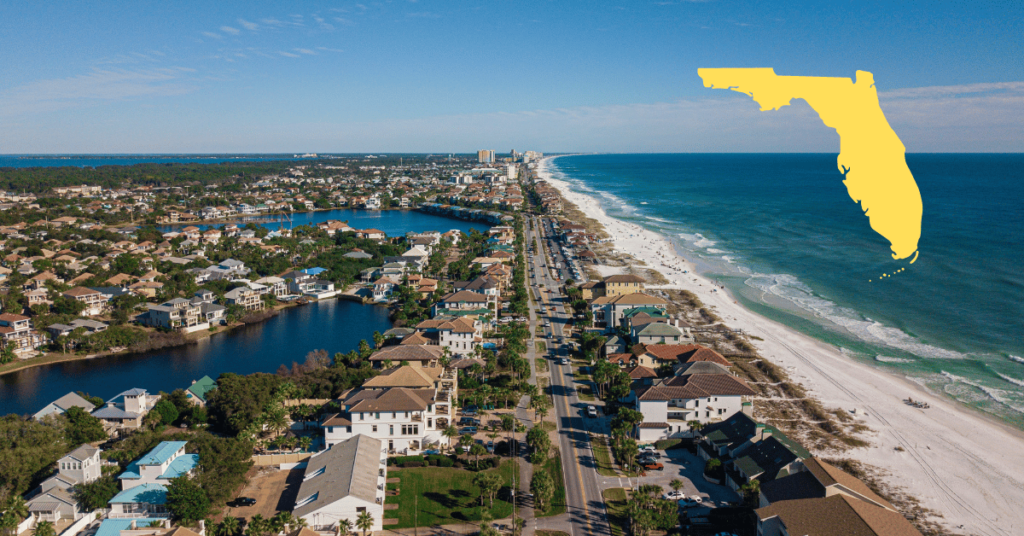Florida is one of the most popular retirement destinations in the United States, and for good reason. The Sunshine State offers warm weather, beautiful beaches, and an attractive tax environment for retirees.
In this article, we’ll explore the tax benefits, cost of living, and key considerations for those thinking about retiring in Florida.
1. Florida’s Tax Benefits for Retirees
One of the biggest reasons retirees flock to Florida is its favorable tax policies. Florida is one of the few states that does not impose a state income tax, which can lead to significant savings for retirees living off Social Security, pensions, and retirement accounts.
No State Income Tax
Florida is a no-income-tax state, which means that retirees do not pay state income taxes on their retirement income. This includes income from:
- Social Security Benefits: 100% tax-free at the state level.
- Pensions: No state income tax on pensions, whether from public or private sources.
- IRA/401(k) Withdrawals: No state tax on retirement account withdrawals.
No Estate or Inheritance Tax
Florida also does not impose an estate tax or inheritance tax, meaning retirees can pass on their assets to heirs without worrying about state-level taxation on their estate.
2. Florida’s Cost of Living for Retirees

While Florida’s tax benefits are highly attractive, the cost of living can vary depending on where in the state you choose to retire. Some parts of Florida are quite affordable, while others—particularly coastal and urban areas—are more expensive.
Housing Costs
Housing is one of the biggest factors in the cost of living. On average, Florida’s housing costs are lower than national averages, but this varies widely:
- Affordable Areas: Cities like Ocala, Lakeland, and Sebring offer affordable housing, making them popular with budget-conscious retirees.
- Expensive Areas: Cities like Miami, Naples, and Palm Beach tend to have higher housing prices due to their prime coastal locations.
Property Taxes
Florida’s property taxes are about average compared to other states. However, the state offers several property tax exemptions for retirees, including:
- Homestead Exemption: Homeowners in Florida may qualify for a homestead exemption of up to $50,000, which can significantly lower property taxes.
- Additional Exemptions: Seniors over 65, disabled veterans, and other eligible groups may qualify for additional property tax relief.
Utilities and Groceries
- Utilities: Florida’s utility costs are generally in line with the national average, though cooling costs may be higher due to the warm climate.
- Groceries: Food costs in Florida are slightly higher than the national average, especially in tourist-heavy areas.
3. Healthcare in Florida
Florida has a well-established healthcare system, especially for retirees. With many medical facilities catering to older adults and a high concentration of Medicare-accepting providers, healthcare is generally accessible. However, healthcare costs in Florida are slightly higher than the national average.
Medicare and Supplemental Insurance
Medicare coverage is available throughout Florida, but retirees may also want to consider supplemental insurance (Medigap) or Medicare Advantage plans to help cover additional healthcare costs.
4. Popular Retirement Cities in Florida

Naples
Naples is one of the most affluent cities in Florida, with a high quality of life and stunning beaches. However, it’s also one of the most expensive places to live in Florida.
- Cost of Living: High, especially for housing.
- Key Benefits: Excellent healthcare, luxury amenities, and vibrant cultural scene.
Tampa
Tampa offers a more affordable option compared to coastal cities like Naples or Miami, while still providing access to beaches and a growing arts scene.
- Cost of Living: Moderate, with affordable housing options.
- Key Benefits: Close proximity to healthcare facilities, cultural events, and outdoor activities.
The Villages
The Villages is a well-known retirement community in Florida, famous for its active lifestyle and social opportunities. This self-contained community is ideal for retirees looking to be part of a vibrant senior population.
- Cost of Living: Moderate, with a focus on affordable housing for retirees.
- Key Benefits: Active retirement community with golf courses, social clubs, and easy access to healthcare.
5. Considerations for Retiring in Florida
Weather and Climate
Florida’s warm climate is appealing to many retirees, but the state’s hot summers and occasional hurricanes are worth considering.
- Hurricane Season: Running from June to November, retirees should be prepared for hurricane risks in certain areas, especially on the coast.
- Warm Winters: The mild winter weather is one of Florida’s biggest draws, particularly for retirees looking to escape cold climates.
Tourism and Crowds
Florida is a major tourist destination, and some areas can become crowded during peak tourist seasons. Retirees may want to consider this when choosing where to live, particularly in popular areas like Orlando and Miami.
Conclusion
Florida’s combination of tax benefits, affordable living (in many areas), and warm climate makes it an attractive option for retirees. However, it’s essential to carefully research specific regions within the state, as costs can vary widely. With no state income tax and relatively favorable property tax policies, Florida remains a top destination for those looking to stretch their retirement income.
If you have any further questions feel free to comment down below or contact retiresmart for any help!
FAQs
What are the tax benefits for retirees in Florida?
Florida offers several tax advantages for retirees, including no state income tax, no taxes on Social Security, pensions, or retirement account withdrawals, and no estate or inheritance tax.
How much does it cost to live in Florida for retirees?
The cost of living in Florida varies depending on the region. Some areas, like Naples and Miami, are more expensive, while others, like Ocala and Lakeland, offer more affordable housing options. On average, housing, groceries, and utilities in Florida are moderately priced.
Are there property tax exemptions for retirees in Florida?
Yes, Florida offers a homestead exemption of up to $50,000, which can reduce property taxes. Seniors over 65, disabled veterans, and other eligible groups may also qualify for additional property tax exemptions.
Is healthcare expensive in Florida?
Healthcare costs in Florida are slightly higher than the national average. However, Florida has many healthcare providers that cater to retirees, and Medicare is widely accepted throughout the state.
What are the most affordable cities in Florida for retirees?
Affordable cities in Florida include Ocala, Lakeland, and Sebring. These cities offer a lower cost of living compared to more expensive coastal areas like Miami and Naples.




